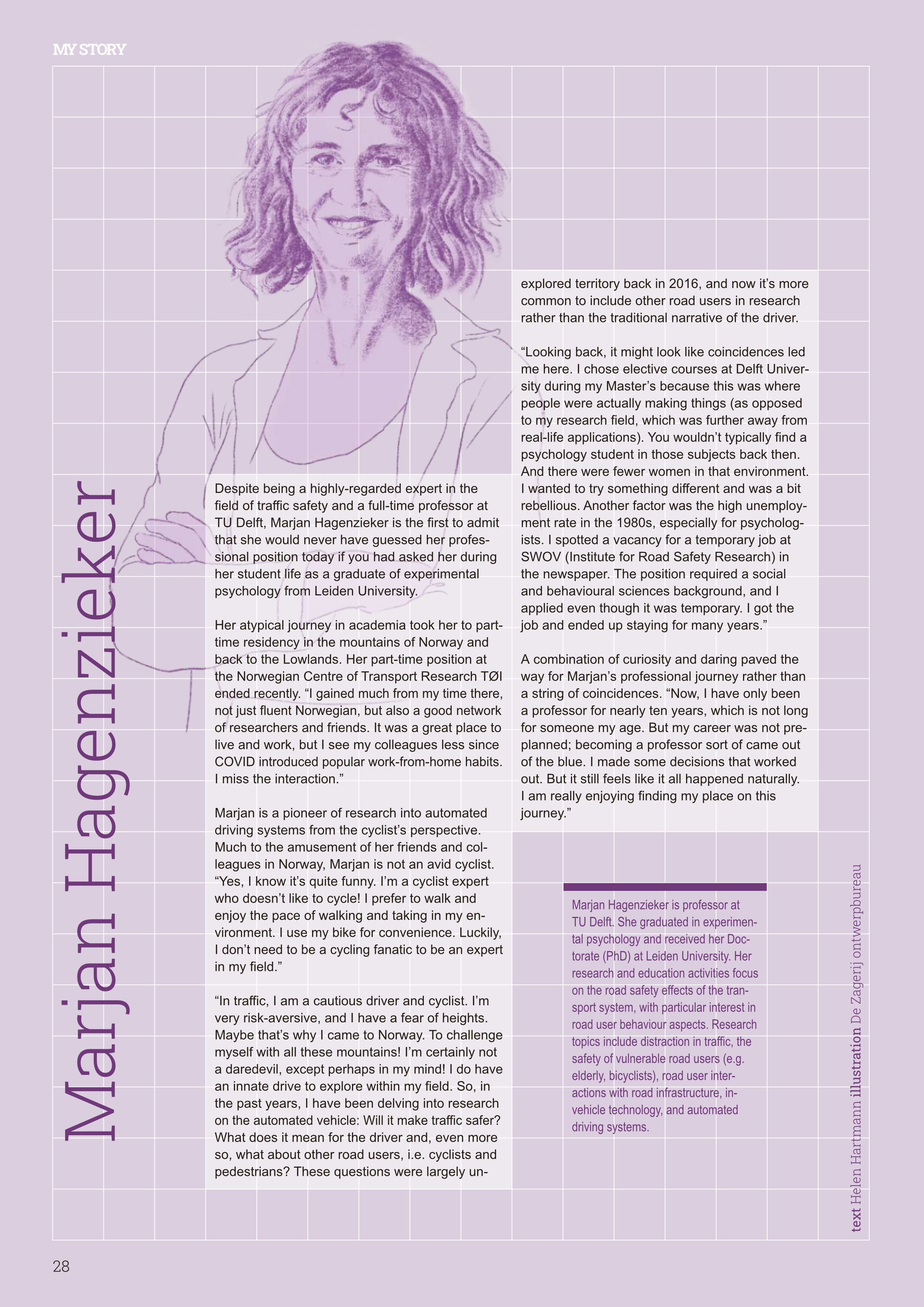Profile of a Safety and Security Researcher: Marjan Hagenzieker
Despite being a highly-regarded expert in the field of traffic safety and a full-time professor at TU Delft, Marjan Hagenzieker is the first to admit that she would never have guessed her professional position today if you had asked her during her student life as a graduate of experimental psychology from Leiden University.
Her atypical journey in academia took her to parttime residency in the mountains of Norway and back to the Lowlands. Her part-time position at the Norwegian Centre of Transport Research TØI ended recently. “I gained much from my time there, not just fluent Norwegian, but also a good network of researchers and friends. It was a great place to live and work, but I see my colleagues less since COVID introduced popular work-from-home habits. I miss the interaction.”
Marjan is a pioneer of research into automated driving systems from the cyclist’s perspective. Much to the amusement of her friends and colleagues in Norway, Marjan is not an avid cyclist. “Yes, I know it’s quite funny. I’m a cyclist expert who doesn’t like to cycle! I prefer to walk and enjoy the pace of walking and taking in my environment. I use my bike for convenience. Luckily, I don’t need to be a cycling fanatic to be an expert in my field.”
“In traffic, I am a cautious driver and cyclist. I’m very risk-aversive, and I have a fear of heights. Maybe that’s why I came to Norway. To challenge myself with all these mountains! I’m certainly not a daredevil, except perhaps in my mind! I do have an innate drive to explore within my field. So, in the past years, I have been delving into research on the automated vehicle: Will it make traffic safer?
What does it mean for the driver and, even more so, what about other road users, i.e. cyclists and pedestrians? These questions were largely unexplored territory back in 2016, and now it’s more common to include other road users in research rather than the traditional narrative of the driver.
“Looking back, it might look like coincidences led me here. I chose elective courses at Delft University during my Master’s because this was where people were actually making things (as opposed to my research field, which was further away from real-life applications). You wouldn’t typically find a psychology student in those subjects back then. And there were fewer women in that environment. I wanted to try something different and was a bit rebellious. Another factor was the high unemployment rate in the 1980s, especially for psychologists. I spotted a vacancy for a temporary job at SWOV (Institute for Road Safety Research) in the newspaper. The position required a social and behavioural sciences background, and I applied even though it was temporary. I got the job and ended up staying for many years.”
A combination of curiosity and daring paved the way for Marjan’s professional journey rather than a string of coincidences. “Now, I have only been a professor for nearly ten years, which is not long for someone my age. But my career was not preplanned; becoming a professor sort of came out of the blue. I made some decisions that worked out. But it still feels like it all happened naturally. I am really enjoying finding my place on this journey.
Marjan Hagenzieker is professor at TU Delft. She graduated in experimental psychology and received her Doctorate (PhD) at Leiden University. Her research and education activities focus on the road safety effects of the transport system, with particular interest in road user behaviour aspects. Research topics include distraction in traffic, the safety of vulnerable road users (e.g. elderly, bicyclists), road user interactions with road infrastructure, invehicle technology, and automated driving systems.
text Helen Hartmann illustration De Zagerij

